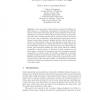1151 search results - page 23 / 231 » The role of game theory in human computation systems |
CHI
2009
ACM
14 years 8 months ago
2009
ACM
This paper examines how different forms of linguistic similarity in a text-chat environment relate to the establishment of interpersonal trust. Sixty-two pairs played an iterative...
ACMACE
2007
ACM
13 years 12 months ago
2007
ACM
In this workshop we investigate a possible role of brain-computer interaction in computer games and entertainment computing. The assumption is that brain activity, whether it is c...
TRIDENTCOM
2005
IEEE
14 years 1 months ago
2005
IEEE
Core to ubiquitous computing environments are adaptive software systems that adapt their behavior to the context in which the user is attempting the task the system aims to suppor...
KDD
2009
ACM
14 years 14 days ago
2009
ACM
We describe a reputation-driven market that motivates human computation sellers (workers) to produce optimal levels of quality when quality is not immediately measurable and contr...
AIIA
2007
Springer
14 years 2 months ago
2007
Springer
Abstract. Game generation systems perform automated, intelligent design of games (i.e. videogames, boardgames), reasoning about both the rule system of the game and the visual real...

